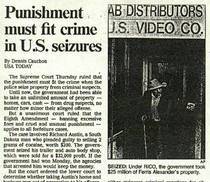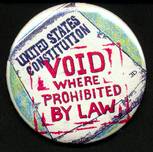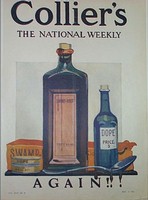 
USA ヘンプ・ミュージアム
 館長から皆さまへ
館長から皆さまへ ヘンプの歴史
ヘンプの歴史 ヘンプと農業
ヘンプと農業 ヘンプの医療と健康
ヘンプの医療と健康 ヘンプ食品
ヘンプ食品 ヘンプ織物
ヘンプ織物 ヘンプ縄と糸
ヘンプ縄と糸 ヘンプパルプ紙
ヘンプパルプ紙 ヘンプ建材
ヘンプ建材 ヘンプ燃料
ヘンプ燃料 ヘンプ原料
ヘンプ原料 ヘンプ溶剤
ヘンプ溶剤 ヘンプ・プラスチック
ヘンプ・プラスチック ヘンプと環境
ヘンプと環境 ヘンプと娯楽と精神世界
ヘンプと娯楽と精神世界  ヘンプと法律
ヘンプと法律 ヘンプと法律
ヘンプと法律 ヘンプとアメリカ憲法
ヘンプとアメリカ憲法 医療ヘンプの法律
医療ヘンプの法律 産業用ヘンプの法律
産業用ヘンプの法律 マリファナ税法 1937
マリファナ税法 1937 解決策 禁止法廃止
解決策 禁止法廃止 政府とバトラーの論争
政府とバトラーの論争 アラスカ合法化へ
アラスカ合法化へ 書簡
書簡 マリファナ雑誌
マリファナ雑誌 館長の裁判闘争
館長の裁判闘争 法律関連図書
法律関連図書  ヘンプと政治
ヘンプと政治 ヘンプ貢献者
ヘンプ貢献者 ミュージアム図書館
ミュージアム図書館 Topに戻る
Topに戻る |
|
Here are a couple of rulings in California CONSTITUTIONAL LAW, I found in the UCLA Law Library:(5) [&469] Possession of Marijuana (and Privacy). In National Organization for Reform of Marijuana Laws v. Gain (1979) 100 C.A.3d 586, 161 C.R. 181, individual taxpayers and an organization brought an action against local law enforcement officials and the district attorney, attacking sections of the Health and Safety Code that prohibit the private possession and use of marijuana by adults. Following the approach in Privitera (supra, &467), the court declared that the California constitutional right of privacy "does not guarantee adult Californians the privilege of smoking a possibly harmful drug, even in the privacy of their homes." (100 C.A.3d 593.) The ruling cited above as precedent from CA CONSTITUTIONAL LAW: (3) [&467] Drug Efficacy Requirement (and Privacy). In People v. Privitera (1979) 23 C.3d 697, 153 C.R. 431, 591 P.2d 919, defendants were convicted of the felony of conspiracy to sell and prescribe the unapproved drug laetrile for the alleviation or cure of cancer. Held, freedom to obtain drugs of unproven efficacy (prohibited by statutes and administrative regulations) is not within the right of privacy guaranteed by the federal or California Constitutions. The United States Supreme Court in Roe v. Wade (supra, &436) and Whalen v. Roe (supra, &443) recognized that certification of a drug's efficacy is a reasonable means to insure health and safety, and that the"important decisions" falling within the right of privacy do not includemedical treatment. (23 C.3d 702, 703,709.) (See 25 UCLA L. Rev. 577[The Drug Efficacy Requirement and the Right of Privacy]; 13 LoyolaL.A. L. Rev. 227 [Privitera]; 5 A.L.R.4th 219 [same]; 13 SouthwesternL. Rev. 531 [A Constitutional Analysis of Federal Drug MarketingRegulations and Food and Drug Administration Implementation]; 39Stanf. L. Rev. 1453 [employee drug-testing legislation].)CURATOR'S NOTE: What we have in the above ruling is the CA Court citing the federal right of privacy, that "important decisions" falling within the right of privacy do not include medical treatment. There is no federal Constitutional right to privacy per se, while California has an enumerated inalienable and fundamental right to privacy which must be subjected to the strictest interpretation by the court, therefore "important decisions" including medical treatment of the citizen's body, ought not to be based on federal law, but the stronger right of the people of California to privacy AS IS THE CASE IN THE STATE OF ALASKA. (See Alaska)
CALIFORNIA CONSTITUTION, ARTICLE 1 CA CODE CIVIL CODE SECTION 1798.1 The Legislature declares that the right to privacy is a personal and fundamental right protected by Section 1 of Article 1 of the Constitution of California and by the United States Constitution.May 16, 2000. The U.S. Supreme Court ruled today in a 5-4 decision that Congress overstepped it authority in allowing rape victims to sue. What was interesting here is that the Court refused to allow Congress free reign in the name of "interstate commerce." The Violence Against Women Act of 1994 is unconstitutional, "Because the federal government has no right to regulate a private act, such as rape, that is neither part of interstate commerce nor caused by state officials."
RE "The Constitution requires a distinction between what is truly national and what is truly local." What does this say about Prop. 215 and its non-economic, non-violent, non-criminal conduct? California lawmakers ought to be ashamed for not knowing the national versus local distinction. They should pass hemp farming laws, medical freedom laws, and private use of pot laws immediately. Before the people have to again take the initiative. It's their job.
Richard M. Davis, We shall see how the conservative court ruled when confronted with the federally mandated "war on some drugs." Senate Judiciary Committee Chairman Orrin G. Hatch (R-Utah) said, "The restoration of federalism scrutiny in our federal courts is a welcome development in the law. The Constitution reserves to the states the 'ordinary administration of criminal and civil justice,'" he said, quoting Alexander Hamilton. U.S. Supreme Court Chief Justice William H. Rehnquist echoed the words of Hamilton when he said, "the Founders denied the National government and reposed in the States...the suppression of violent crime and vindication of its victims."
"The act invades the reserved rights of the states. It is a statutory plan to regulate and control agricultural production, a matter beyond the powers delegated to the federal government. "
|




